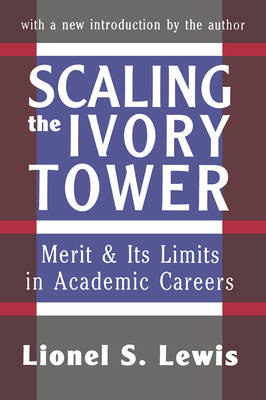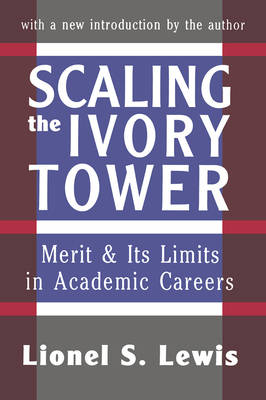
En raison d'une grêve chez bpost, votre commande pourrait être retardée. Vous avez besoin d’un livre rapidement ? Nos magasins vous accueillent à bras ouverts !
- Retrait gratuit dans votre magasin Club
- 7.000.000 titres dans notre catalogue
- Payer en toute sécurité
- Toujours un magasin près de chez vous
En raison de la grêve chez bpost, votre commande pourrait être retardée. Vous avez besoin d’un livre rapidement ? Nos magasins vous accueillent à bras ouverts !
- Retrait gratuit dans votre magasin Club
- 7.000.0000 titres dans notre catalogue
- Payer en toute sécurité
- Toujours un magasin près de chez vous
Scaling the Ivory Tower
Merit and Its Limits in Academic Careers
Lionel S Lewis
Livre relié | Anglais
274,95 €
+ 549 points
Format
Description
Nearly 85 years ago, Wesley Clair Mitchell, the acknowledged leader of American economists during the first half of this century, wrote: "Important as the art of spending is, we have developed less skill in its practice than in the practice of making money. Common sense forbids our wasting dollars earned by irksome efforts; and yet we are notoriously extravagant. Ignorance of qualities, uncertainty of taste, lack of accounting, carelessness about pricesà. Many of us scarcely know what becomes of our moneyà."More than ever, in our world of ever-increasing credit card debt, lenient bankruptcy laws, and runaway consumption, these words still ring true. This collection of Mitchell's essays, makes it easier for today's and tomorrow's economists and social scientists to become acquainted with Mitchell's many contributions to the study of the American economy.Regrettably, the passage of time can blur and even obliterate the reputation and achievements of yesterday's leaders of ideas and actions. Although the National Bureau of Economic Research, which Mitchell helped to found and which he led in the 1920s and 1930s, remains a leading research institution, relatively few of its associates, who represent the elite among U.S. academic economists, have any first-hand acquaintance with Mitchell's work. Eli Ginzberg rounds out this edition with Mitchell's comprehensive analysis of "Business Cycles," first published in 1929, an area that commanded most of his scholarly efforts. Ginzberg's essay on Mitchell, written in 1931 and published for the first time in 1997, serves as an appropriate introduction to this new edition. His afterword contains remarks delivered at the 50th anniversary of Mitchell's death at the meeting of the Allied Social Sciences Association held in Chicago early in 1998, a telling tribute to this undisputed giant in the field.Wesley Clair Mitchell (1874û1948) held major teaching posts at the University of California and Columbia University
Spécifications
Parties prenantes
- Auteur(s) :
- Editeur:
Contenu
- Nombre de pages :
- 238
- Langue:
- Anglais
Caractéristiques
- EAN:
- 9781138532229
- Date de parution :
- 15-03-18
- Format:
- Livre relié
- Format numérique:
- Genaaid
- Dimensions :
- 152 mm x 229 mm
- Poids :
- 521 g

Les avis
Nous publions uniquement les avis qui respectent les conditions requises. Consultez nos conditions pour les avis.






